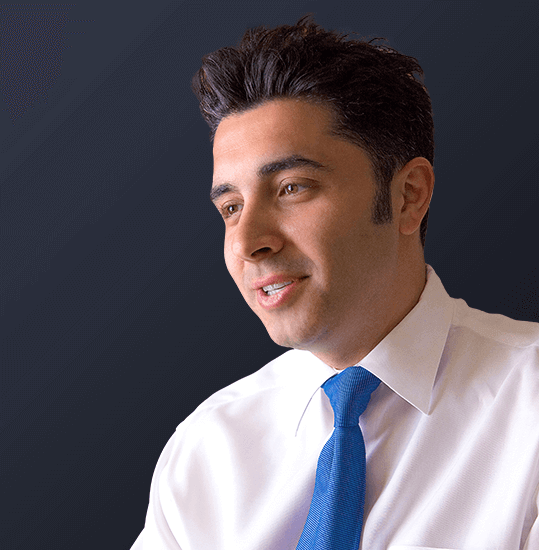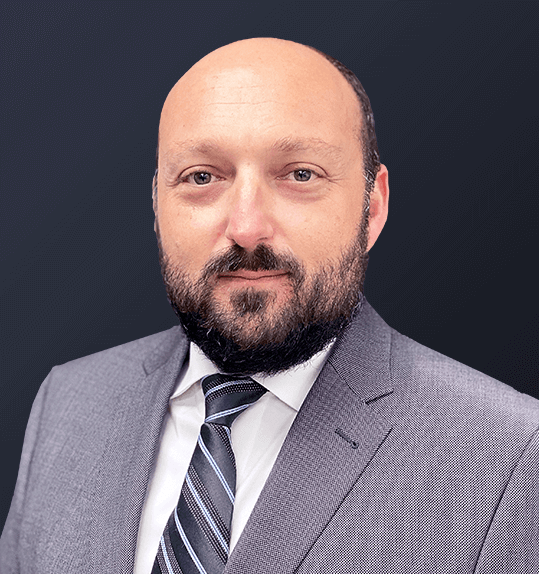California
Brain Injury Lawyer$10MM +
Recovered for Clients
1000 +
Injured Clients
3.5 ×
Higher compensation*
No Recovery.
No Fee.

A traumatic brain injury can alter the course of a person’s life. In one moment, their dreams, aspirations, hopes, and desires can drop away forever. Unfortunately, brain injuries may cause short-term and long-term disability. If you or a loved one suffered a brain injury due to the negligence of another party, then contact Vaksman Khalfin, PC today to learn more about the legal options available to you.
Brain injuries in California are a serious issue, often leading to long-term physical and cognitive impairments, emotional distress, and financial burdens for victims and their families. In such cases, securing the services of a specialized lawyer can be critically important. A California brain injury lawyer is equipped with the legal expertise necessary to handle every aspect of your personal injury case.
Brain injury attorneys in California must stay abreast of evolving state laws and industry-standard care requirements. They strive to represent their clients with diligence and compassion, recognizing the profound effects that brain injuries can have on an individual’s quality of life. For anyone facing the aftermath of a traumatic brain injury, finding a lawyer with the necessary expertise and a track record of success can be a crucial step in the journey toward justice.
Robert B. Vaksman, Esq.
Founding Partner
“Some cases are easier than others, but this doesn’t matter at Vaksman Khalfin, because we have the resources to help our clients no matter what is at stake, especially if it’s hard."

ALAN D. KHALFIN, ESQ.
Partner & Managing Attorney
"People call me when they need to plan, but also when something terrible has happened and they need help. It is personal to my clients, so it is personal to me. We have to help — no matter what."

More about brain injury in California
The Consequences for Sufferers of Traumatic Brain Injuries
Individuals who suffer traumatic brain injuries often face cognitive problems which can affect their physical health, their ability to work, and their ability to form relationships with others. Some brain injury victims experience clinical depression, debilitating anxiety, and seizures. Oftentimes brain injury victims will experience memory loss and other cognitive problems which can impair their ability to work and have relationships with others.
Why Hire a California Brain Injury Lawyer
Traumatic brain injury cases often involve expert witnesses. These witnesses are typically neuroscientists, neurologists, or psychiatrists who testify about the injured party’s brain injury. Deposing these witnesses takes a considerable amount of preparation, even for seasoned attorneys.
A brain injury lawyer will also be able to conduct legal research and save time by fighting your case on procedural grounds before proceeding to substantive matters. The knowledge and experience an attorney possesses can save you time and energy and as you fight to protect your legal rights. It is always helpful to seek out legal advice before you make any decisions regarding filing a civil lawsuit.
What Are The Most Common Causes of Brain Injuries?
Traumatic brain injuries can arise in many different circumstances. Therefore, it is important to remember the following common causes of traumatic brain injuries:
- Blunt force trauma;
- Head injuries;
- Seizures
- Automobile accidents.
Recognizing the signs and symptoms of a traumatic brain injury may be difficult for those who are unfamiliar with them.
Symptoms of Traumatic Brain Injuries
Traumatic brain injuries can produce numerous symptoms. The following are some of the most common symptoms associated with traumatic brain injuries:
- Excessive sleep;
- Difficulty sleeping;
- Depression;
- Anxiety;
- Mood swings;
- Memory lapses;
- Losing consciousness for a few seconds to a few minutes;
- Feeling confused or disoriented.
It is possible for symptoms associated with a head injury to have a delayed onset. Sometimes symptoms may not become noticeable until days or weeks after the accident. Therefore, if you think you have any brain injury symptoms, then you should seek out medical treatment as soon as possible.
Signs of Traumatic Brain Injuries
The following are some of the most common signs of a traumatic brain injury:
- Confusion;
- Loss of consciousness;
- Nausea;
- Blurred vision;
- Fatigue;
- Memory issues;
- Slurred speech;
- Dizziness;
- Headache.
It is important to seek medical treatment immediately if you notice any of these signs. Ignoring the symptoms and signs of a traumatic brain injury can lead to coma or death. It is therefore essential that you pay attention to your state of mind and your perception during the immediate aftermath of any type of accident in which you suffer bodily injuries.
Types of Traumatic Brain Injuries
Brain injury cases come in various forms, and they can be divided on the basis of injury severity and cause. California brain injury lawyers may encounter the following types of brain injuries:
- Traumatic Brain Injury (TBI): Caused by external forces such as a blow or jolt to the head. Examples include injuries from car accidents, falls, and sports impacts.
- Acquired Brain Injury (ABI): Occurs at the cellular level and is generally not caused by external trauma. An acquired brain injury may result from stroke, lack of oxygen to the brain, or infectious diseases.
- Concussion: A concussion is a mild traumatic brain injury that impairs cognitive function. These injuries may happen after an impact to the head or after a whiplash-type injury that causes the brain to move inside the skull.
- Diffuse Axonal Injury: A diffuse axonal injury is caused by strong rotation or shaking of the head, as with shaken baby syndrome or high-speed vehicle accidents. These injuries typically involve extensive lesions in white brain matter tracts.
- Penetrating Injury: Penetrating injuries occur when an object pierces the skull and breaches the brain’s protective layers. These injuries are often caused by bullets, shrapnel, or other sharp objects.
Lawyers handling these cases must understand the complex medical aspects involved and the specific legal considerations pertinent to each injury type. They also work with medical experts to demonstrate the injury’s impact on a client’s life.
Preventing Traumatic Brain Injuries
Brain injuries can have devastating and long-lasting effects. Implementing effective prevention strategies is crucial in reducing the incidence of brain injuries. These strategies include adherence to safety regulations and educating the public through awareness campaigns.
Safety Regulations
Safety regulations are essential in preventing brain injuries. They ensure that workplaces have mandatory protective gear like helmets for construction workers. Also, sports organizations enforce the use of appropriate headgear and conduct regular safety checks. Traffic laws include mandatory helmet laws for cyclists and motorcyclists, and strict seat belt laws for vehicle occupants.
Public Awareness Campaigns
Campaigns aimed at educating the public play a vital role in brain injury prevention. These campaigns often focus on the following:
- Promoting safe practices in sports and recreational activities to prevent concussions and other head injuries.
- Informing parents on how to prevent head injuries in children, like ensuring the proper use of car seats and supervising children on the playground.
- Educating individuals about the risks of brain injuries and ways to prevent them, such as the importance of wearing helmets while biking or skiing.
Effective public awareness campaigns regarding traumatic brain injuries can lead to a more informed public and safer behaviors that help prevent brain injuries.
What You Can Expect
Free Consultation
1
Free Consultation
2
Free Consultation
3
Free Consultation
4
How it works
We will fight for your rights.
Complimentary consultation
1
Complimentary consultation
2
Complimentary consultation
3
Who Can Be Found Liable For a Traumatic Brain Injury?
Sometimes traumatic brain injury cases feature multiple defendants. It is therefore important to recognize that individual human beings, corporations, limited liability companies, and other legal entities may all be named as defendants in a single personal injury lawsuit.
These individual defendants may be associated with each other. However, defendants may also implement third-party defendants into the case typically to respond to indemnity or contribution claims. It can be difficult to determine which parties are liable for the plaintiff’s injuries, so an attorney may need to conduct discovery to assess which parties need to be dismissed from the case.
Any defendant named in a brain injury lawyer was likely at least negligent. The four elements of negligence must be proven by a preponderance of the evidence. Generally, this is interpreted to be 50% or greater. Therefore, the defendants named in a traumatic brain injury case may many or few depending on the facts of the case and the nature of the plaintiff’s injuries.
What Compensation Is Available For Victims?
Brain injuries often cause a diverse range of symptoms which vary depending on the severity of the injury. Unfortunately, extremely severe brain injuries may cause death or permanent disability. Less severe brain injuries may cause victims to suffer from depression, anxiety, and post-traumatic stress disorder.
Those who suffer traumatic brain injuries may seek financial compensation for their injuries. The types of injuries a plaintiff may claim are often categorized as special damages or general damages. Special damages refer to those losses which can be quantified, including medical bills, lost wages, and property damage. General damages are more subjective to the individual victim, and these include pain and suffering, emotional distress, and loss of enjoyment of life.
Punitive damages are also available in brain injury cases depending on whether or not the defendant acted wantonly, maliciously, or willfully. Punitive damages are not tied to the direct losses from the injury; they are intended to punish the defendant and to deter the defendant from committing the same conduct in the future.
Punitive damages are awarded at the court’s discretion and are not a component of every case. They often are awarded in cases where a defendant’s actions are found to be especially harmful or malicious.
Understanding Brain Injury Law in California
In the State of California, brain injury law covers the legal rules applied to those individuals who have suffered brain injuries due to another party’s negligent act or intentional wrongful act. Those who suffer these types of injuries may seek financial compensation in a personal injury case. The injured party typically seeks financial compensation for medical bills, lost earnings, and pain and suffering.
California adheres to the comparative negligence rule. This means a plaintiff can recover monetary compensation even if they are partially responsible for their own injury, with the amount reduced by their percentage of fault. The state also adheres to the statute of limitations, which is typically two years from the date of the injury.
The following are the four elements of a negligence claim:
- Duty of Care: Establishing that the defendant owed a duty of care to the plaintiff;
- Breach: The defendant breached that duty through action or inaction;
- Causation: The breach of duty caused the injury;
- Damages: Documenting economic and non-economic losses resulting from the injury.
Victims of brain injuries should seek qualified legal representation to navigate California’s legal system. A brain injury lawyer in California can help with the following:
- Investigating: Gather evidence, including medical records and witness statements;
- Filing: Prepare and submit necessary legal documents within specified deadlines;
- Negotiating: Communicate with the responsible parties or insurance companies;
- Litigating: Represent the plaintiff in court if a settlement is not reached.
California law recognizes the severe impact a brain injury can have on an individual’s life, advocating for the rightful compensation of affected parties through its legal system.
When seeking information about brain injury law in California, several resources are available to help prospective clients understand the scope of their legal claims. The California Department of Rehabilitation (DOR) is a good starting point. It provides services and advocacy resulting in employment, independent living, and equality for individuals with disabilities, including those who have sustained brain injuries.
Another valuable resource is the Brain Injury Association of America (BIAA). BIAA offers support and resources for brain injury survivors, their families, and professionals. They stay abreast of current laws and can offer guidance on legal rights and services.
For legal statutes and information specific to brain injury litigation in California, the California Courts official website is an essential resource. It provides access to relevant statutes, case law, and court procedures.
Legal Process for Brain Injury Claims
Understanding the legal process for brain injury claims in California means comprehending the specific steps involved in litigating legal claims. The initial consultation is typically the first step in this process.
Initial Consultation
At the outset, the claimant, often accompanied by a family member, meets with a brain injury lawyer to discuss the incident. The lawyer evaluates the case’s validity, severity of the injury, and potential compensation avenues. It’s crucial the claimant provides medical records and any evidence related to the brain injury during this meeting.
Claim Filing Procedures
Once legal representation is established, the lawyer files a claim on the claimant’s behalf. This entails completing and submitting the required legal documents, including a complaint, to the appropriate court. The documents must clearly state the allegations and the damages sought.
Key Steps in Filing a Claim
- Drafting the complaint
- Filing the complaint with the court
- Serving the complaint to the defendant(s)
Negotiation and Litigation
After the claim is filed, the parties may enter into negotiation in an attempt to reach a settlement. A lawyer typically engages with the defendant’s insurance company or legal counsel to agree on compensation without going to trial.
If negotiations fail, the case proceeds to litigation. The brain injury lawyer represents the claimant in court, presenting evidence and arguments before a judge or jury. They aim to secure a fair judgment, which considers both economic and non-economic damages suffered by the claimant.
How to Choose the Right Brain Injury Attorney in California
Choosing the right lawyer means aligning your legal needs with the professional services offered by an experienced brain injury attorney. You need to trust your legal advocate and believe that they have your best interests in mind.
Why Choose Vaksman Khalfin, PC?
Choosing the right attorney means finding legal representation that is dependable, reliable, and considerate. Also, you want to hire attorneys who will enforce your legal rights and do everything within their power to provide you with exceptional legal representation. The knowledgeable brain injury lawyers at Vaksman Khalfin, PC can help you every step of the way. Contact us today to schedule a free consultation.
SUBMIT YOUR CONTACT DETAILS 100% Free Consultation, Always. Free Consultation.
